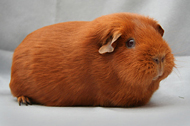
Self Pink Eyed Golden
NCC Show Regulations
You can download the latest National Cavy Club Show Regulations here.
CAVIES magazine
The monthly CAVIES magazine is the official publication of the British Cavy Council and the National Cavy Club. Visit the CAVIES website for more information.
Welfare Code
The British Cavy Council has produced a Code of Practice that outlines the welfare needs of cavies.
Use of Prefix Certificate
The purpose of the BCC registration certificate is simply to confirm that a fee has been paid by someone to give him or her the sole use of the stud name when exhibiting stock at UK cavy shows. It is in no way an endorsement of the quality of stock. More.
Photographs
The majority of the photographs on this site have been kindly provided by Lyndon Nowell and Evelyne van Vliet. Please do not copy any of these images without the permission of the BCC
The British Cavy Council (BCC) champions the exhibition and promotion of purebred cavies (guinea pigs). It is not a club or an association with members, rather it comprises representatives from each of the thirteen Specialist Breed Clubs in the UK, plus a Chairman and a Secretary/Treasurer.
The aim of this website is to provide a source of reference material related to the objectives of the BCC, that is freely and instantly available to any interested cavy fancier in the UK or abroad. If you are new to cavies, you might find it useful to visit our satelite-site first for an introduction to the cavy and the cavy fancy.
On the following pages, you can learn about the BCC, view its Objectives and its Constitution and Rules, and read minutes of its previous meetings. You can also find out more about the Breed Clubs that it serves and the breeds that they cater for, including details of the Breed Standards, galleries of photographs, links to Breed Club web sites, and Breed Club contact details. If you would like to know more about Breed Standards, there are links to pages that explain how standards are developed and how they should be applied.
The BCC is charged with maintaining a Stud Prefix Register. The Register can be viewed on screen, and information can be found on how to apply for a prefix.
The Information tab provides a library of useful articles on breeds of cavy and related matters, as well as links to other cavy-related web sites. Finally, there are links to adverts posted by Specialist Breed Club members and contact details for key posts within the BCC.
Headline news
January 2025
The Argente, Magpie, Harlequin and Lunkarya have been awarded Full Standards. Amendments have been made to the Consitution and Rules to reflect the introduction of Development Classes.
January 2024
The Californian, the Chinchilla, the Swiss, and the Tortoiseshell have been awarded Full Standards. The Tweed has been recognised as a New & Emerging Breed. Changes have been made to the description of head shape across many breeds. Revisions have been made to the Belted and the Ridgeback Guidance Notes.
January 2023
The Minipli has been awarded a Guide Standard.
December 2018
From 01.01.2019, the Self Blue has been awarded a Full Standard, and amendments have been made to the Himalayan standard.
November 2017
The British Cavy Council met on 7th October 2017. The minutes are available here.
December 2016
Modifications have been made to eye colour in the Self, Agouti and Solid Agouti Breed Standards, and to the recognised colours of Dutch cavies. Amendments have also been made to the Swiss Guide Standard and to BCC Rule 2.2.
December 2016
The British Cavy Council met on 8th October 2016. The minutes are available here.
